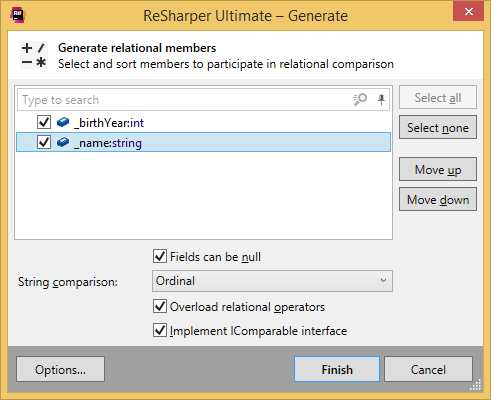Generate Relational Members
Alt+Insert | Relational Members
ReSharper_GenerateRelationalMembers
ReSharper helps you automatically overload relational operators and implementations of related interfaces using selected fields and properties. By default, ReSharper will create an implementation of IComparable<T>, and optionally, operators >, <, ≥ and ≤ as well as an implementation of IComparable are generated too.
In the example below, this command is used to generate relational members that takes into account int _birthYear and string _name fields when to compare objects of the Person class.
| Before generation | After generation |
|---|---|
class Person
{
private int _birthYear;
private string _name;
}
|
class Person : IComparable<Person>, IComparable
{
private int _birthYear;
private string _name;
public int CompareTo(Person other)
{
if (ReferenceEquals(this, other)) return 0;
if (ReferenceEquals(null, other)) return 1;
var birthYearComparison = _birthYear.CompareTo(other._birthYear);
if (birthYearComparison != 0) return birthYearComparison;
return string.Compare(_name, other._name, StringComparison.Ordinal);
}
// Optionally: Implementation of IComparable and relational operators
public int CompareTo(object obj)
{
if (ReferenceEquals(null, obj)) return 1;
if (ReferenceEquals(this, obj)) return 0;
if (!(obj is Person))
throw new ArgumentException($"Object must be of type {nameof(Person)}");
return CompareTo((Person) obj);
}
public static bool operator <(Person left, Person right)
{
return Comparer<Person>.Default.Compare(left, right) < 0;
}
public static bool operator >(Person left, Person right)
{
return Comparer<Person>.Default.Compare(left, right) > 0;
}
public static bool operator <=(Person left, Person right)
{
return Comparer<Person>.Default.Compare(left, right) <= 0;
}
public static bool operator >=(Person left, Person right)
{
return Comparer<Person>.Default.Compare(left, right) >= 0;
}
}
|
Generate relational members
In the editor, set the caret at the type name or within a type at the line where you want to insert relational members. If the caret is on the type name, the generated code will be added in the beginning of the type declaration.
Press Alt+Insert or choose from the main menu. Alternatively, you can press Control+Shift+A, start typing the command name in the popup, and then choose it there.
In the Generate popup, select Relational Members.
- In the Generate dialog that appears, you will see a list of properties and fields. Select the members that you want to use for type comparison.

If there are no fields/properties in your type or you do not select any of them, ReSharper, depending on your settings, throws new
NotImplementedException(), returns default value, or puts code that will not compile in the body of the generated methods. You can configure the settings on the page of ReSharper options.Optionally, use the following controls in the dialog:
Fields can be null — appears if there are any nullable fields or properties in your type. By default, this checkbox is selected, meaning that ReSharper will generate null checks for selected fields. You can clear this checkbox if you do not need null checks.
String comparison — appears if there are any string fields in your type. ReSharper will generate
string.Compare(string, string, StringComparison)for the selected strings, and the selector lets you choose which value should be generated for the StringComparison argument.- CompareTo already exists — appears if an implementation of
CompareTo()already exists and lets you choose whether to:Replace the method if it already exists.
Put the newly generated method side by side with the existing one.
Skip generating a new method altogether.
Implement IComparable interface — tick this checkbox to generate an implementation of
IComparableinterface in addition toIComparable<T>, that is generate theCompareTo(object)method in addition toCompareTo(T).
Click Finish to complete the wizard.
You can also click Options to review or modify common code generation preferences on the page of ReSharper options.
This feature is supported in the following languages and technologies:
The instructions and examples given here address the use of the feature in C#. For details specific to other languages, see corresponding topics in the ReSharper by Language section.